It will be impossible to eradicate the fungus threatening to destroy Britain's ash trees, the environment secretary, Owen Paterson, acknowledged on Friday.
An action plan agreed at a meeting of the government's emergency response committee, Cobra, will focus on harnessing the help of the public to try to slow the spread of the disease, while searching for trees that have a genetic resistance to the disease that could provide stock for a new breeding programme.
More than 100,000 newly planted and nursery trees with the disease have already been destroyed and that will continue, Paterson said. But mature trees will not be burned, because they are important for other wildlife and may help identify resistant strains. Paterson also promised a "very, very radical" overhaul of his priorities at the Department for Environment, Food and Rural Affairs (Defra), with much more spent on tackling the rising number of exotic diseases affecting plants and trees, and less spent in other areas.
"It won't be possible to eradicate this disease now that we have discovered it in mature trees in Great Britain," said Paterson. "However, that does not necessarily mean the end of the British ash. If we can slow its spread and minimise its impact, we will gain time to find those trees with genetic resistance to the disease. Wildlife and countryside groups will play a major role in minimising the impact of the disease and so will the general public, especially when it comes to spotting other areas where the disease has taken hold."
Martin Harper, RSPB conservation director, said: "The plan is a vital part of stopping the spread of this disease. However, it is essential we do not divert resources away from other vital environmental services. Money must be found from central government coffers or we will simply be robbing Peter to pay Paul."
The number of sites identified with ash infected with the Chalara fraxinea fungus has risen from 115 on Wednesday to 129 on Thursday, after what Paterson called an "unprecedented" nationwide survey involving around 500 people. The government has already banned the import of ash trees and movement of trees around the country.
Simon Pryor, natural environment director of the National Trust, said: "We welcome the action plan but we are surprised the government is saying that it will not be possible to eradicate the disease. Given our limited understanding of this disease in this country, we believe we should keep an open mind as to whether it may be possible to eradicate it, or at least contain it within the core area in the east."
Prof Ian Boyd, the Defra's chief scientific adviser, said: "By next season we could potentially have resistant forms of ash growing, though as very small saplings." Paterson cautioned against false hope, but said: "The great thing is ash reproduces quite quickly. If we know a small number of trees survived the very intense epidemic in Denmark [where 90% were infected], there must be hope here." He added: "What is regrettable is that I don't have a pot of magic potion to go up in a helicopter and spray on infected trees. There is no chemical we know of that kills this fungus."
Paterson criticised current European Union trade rules: "At the moment forestry and plant products are treated by the European Union as freely tradable products – is that really appropriate? We need to have a radical rethink." He acknowledged the growing problem of new plant diseases arriving in the UK. "There are a number of very dangerous diseases out there which pose a real threat. I am prepared to consider radical proposals to protect the woodland environment and look forward to seeing Boyd's interim proposals at the end of November."
Ash dieback may have arrived in Britain after spores were blown on the wind from continental Europe, or via infected trees imported by the horticultural trade, or both. But Boyd said the "balance of probabilities is swinging towards it being wind-blown", based on the pattern of known infections in the wild, which are clustered in the south-east of England. "We can do nothing about that," he said, noting that wind-blown spores may extend the infected area by 20-30km a year.
Ministers have been criticised for being slow to act, after the Horticultural Trade Association asked government to ban ash imports in 2009. However, at that time the fungus causing ash dieback was thought to be already endemic in the UK, meaning no ban was possible. In 2010, scientists realised that the deadly fungus was in fact a similar but distinct species. The first British case of the disease was confirmed in February 2012 in a tree imported from the Netherlands to a nursery in Buckinghamshire. In 2011, trade unions at the Forestry commission warned that its ability to tackle tree diseases would be hit by the 25% cuts to the agency.
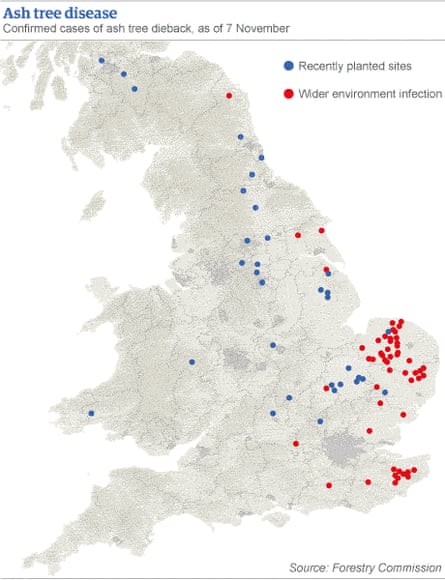
Paterson said he had met his predecessors as environment secretary, Caroline Spelman and Hilary Benn, this week. He also appeared to rule out financial aid to affected plant businesses: "It has never been policy to pay compensation on plant losses."
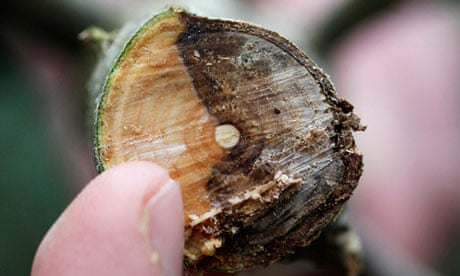
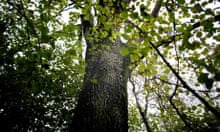

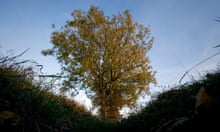
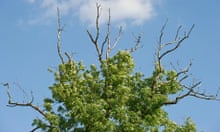
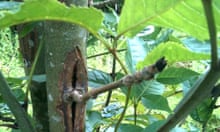
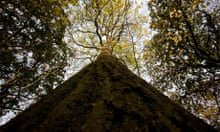
Comments (…)
Sign in or create your Guardian account to join the discussion